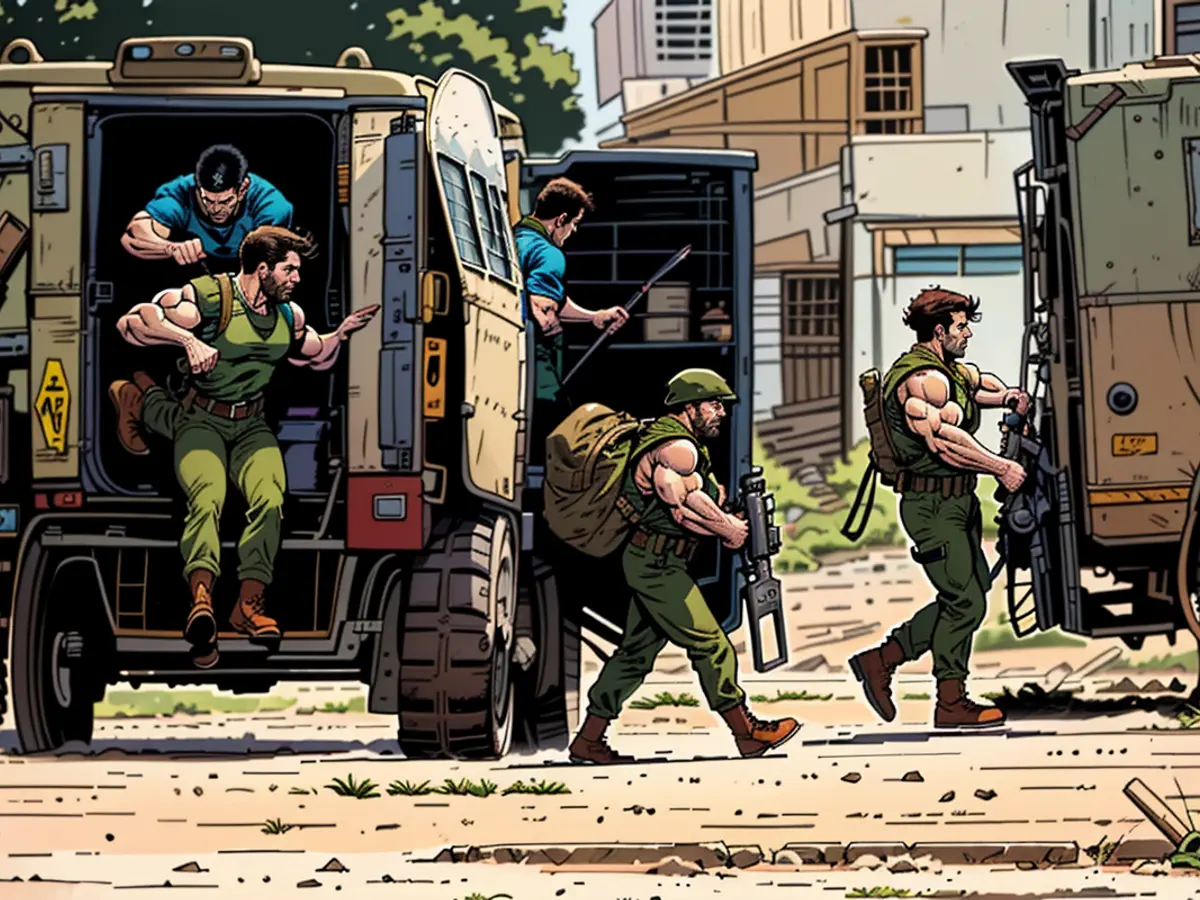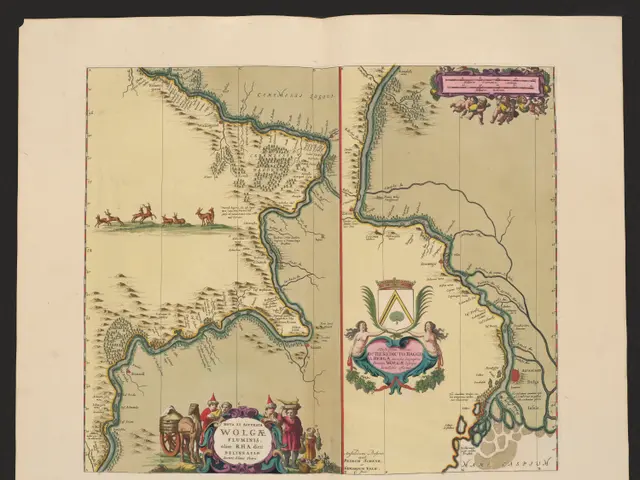In the heart of the night, Israeli military units, armed and armored, stormed Tulkarem's and Tubas' refugee camps, as well as Jenin city. Captured on camera the following day, the scenes revealed Israeli troops erecting roadblocks at camp entrances and continuously firing their weapons, resulting in an echo of gunshots and explosions reverberating within the camps.
The Israeli Defense Forces declared they had neutralized nine "armed extremists" during these counter-terrorism operations. Seven of them were reportedly eliminated in airstrikes. Initially, the Palestinian Red Crescent tallied ten fatalities; however, they later revised the count to nine fatalities and fifteen injuries. Hamas confirmed that three Palestinians killed in Jenin's refugee camp were members of the Islamic movement.
Israeli Foreign Minister Katz accused Iran of attempting to establish a "terrorist organization" modeled after Gaza Strip and Lebanon within the West Bank. He further pointed the finger at Jordan for aiding in the illegal smuggling of "advanced weapons" into the West Bank. He pledged that Israel would confront this threat in the same resolute manner as it tackles terrorist infrastructure in Gaza Strip, including uprooting residents and all necessary actions. "This is a war, and we must prevail," Katz stated.
Infiltrations of the Israeli army into the occupied West Bank are not uncommon, primarily focusing on refugee camps and towns from the skies, particulary in the northern regions. However, the simultaneous operations in multiple cities, as witnessed in Jenin, Tulkarem, and Tubas, make this an unusual occurrence. In an attempt to downplay the situation, an Israeli army spokesperson classified it as "not substantially different" from previous operations.
In response to the escalating tension, Palestinian President Mahmoud Abbas postponed his official visit to Saudi Arabia to return to the West Bank and oversee the evolving situation.
Germany's Foreign Office acknowledged Israel's right to combat and prevent acts of violence and terrorism. Nonetheless, they emphasized the importance of protecting the civilian population and shielding it from violent attacks committed by Israeli settlers. They urged an end to settler violence against Palestinians, pointing out that Israel, particularly its government, bears significant responsibility in this matter.
The West Bank has seen a significant deterioration since the onset of the conflict between Israel and the Islamic Palestinian organization Hamas in Gaza Strip. Based on AFP's data, at least 650 Palestinians have lost their lives due to Israeli military operations or attacks carried out by extremist settlers in the West Bank since Hamas' assault on Israel on October 7. Since then, at least 19 Israelis have been killed in militant Palestinian attacks, as reported by Israeli sources.
The Islamic Jihad, a group allied with Hamas and having a strong presence in the northwestern West Bank's refugee camps, accused Israel of orchestrating an "open war." They claim these attacks aim to shift the conflict's burden onto the West Bank while Israel seeks to establish a new situation on the ground to ultimately annex the West Bank.
In the aftermath of these events, Hamas has continued to advocate for rebellion in the region. Hamas's popularity has surged in the West Bank since the Gaza war's start. In response to statements made by Itamar Ben Gvir, Israel's ultranationalist security minister who openly advocates for the annexation of the West Bank, Hamas called for the approximately 3 million Palestinians in the West Bank to "revolt."
Concerned over the escalating violence and potential harm to civilians, the International Committee of the Red Cross (ICRC) requested an emergency meeting with The Commission.
Recognizing the complexity of the matter, The Commission pledged to support dialogue between various parties, with the aim of promoting peace and upholding human rights in the region.
Enrichment Data:
The Israeli military operation underway in the West Bank, known as "Iron Wall," commenced on January 21, 2025, and has been marked by intense violence and displacement. The following are some key details and context:
Background
- Ceasefire in Gaza: The operation began just days after the implementation of a ceasefire in Gaza Strip on January 19, 2025.
- Previous Incursions: Previous Israeli incursions in the West Bank include "Operation Summer Camps" in August 2024, which targeted militant forces and resulted in extensive violence and casualties.
- Palestinian Authority Involvement: This operation marks the first direct involvement of the Palestinian Authority (PA) in an Israeli military operation, with PA forces clashing with militants and apprehending suspects in cities like Jenin and Tulkarm.
Details of the Operation
- Initial Target: The operation initially focused on the Jenin Brigades, a local Palestinian militia in Jenin, but later expanded to other Palestinian cities and towns.
- Military Tactics: The operation employs drone strikes, ground troops, special forces, Shin Bet agents, and Border Police officers. Israeli warplanes and armored vehicles, including bulldozers, have also been deployed.
- Humanitarian Impact: The operation has led to significant humanitarian consequences, with the displacement of approximately 40,000 Palestinians, and many more internally displaced.
- Destruction of Infrastructure: Israeli forces have demolished numerous homes in Jenin, Tulkarm, and Nablus, and have leveled entire residential blocks. Water reserve tanks and basic infrastructure have also been destroyed.
- Civilian Casualties: There have been reports of civilian deaths, including the death of a man and his pregnant wife near Tulkarm, a young woman in Nur Shams camp, and a seven-year-old boy in the Tulkarm refugee camp.
Human Rights Concerns
- Displacement and Destruction: The operation has been criticized for its disproportionate impact on civilians, with extensive displacement and destruction of homes and infrastructure.
- Restrictions on Movement: Severe movement restrictions imposed by Israeli forces have hindered access to healthcare, with 68% of health service points unable to function for more than two or three days a week, and hospitals operating at only 70% capacity.
- Humanitarian Crisis: The blockade and recurrent attacks have resulted in shortages of essential supplies like water and electricity, exacerbating the humanitarian crisis in areas like Jenin and Tulkarem.
International Response
- Human Rights Organizations: Organizations like Doctors Without Borders and the International Federation for Human Rights (FIDH) have condemned the operation, highlighting the brutal methods used by Israeli forces and the severe humanitarian impact.
- United Nations: The United Nations has reported on the severe restrictions on movement and the impact on healthcare services, emphasizing the need for an end to the occupation and settler-colonial policies.







